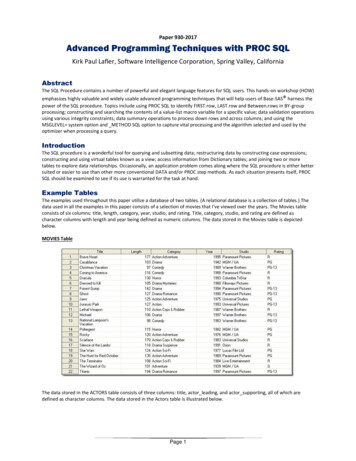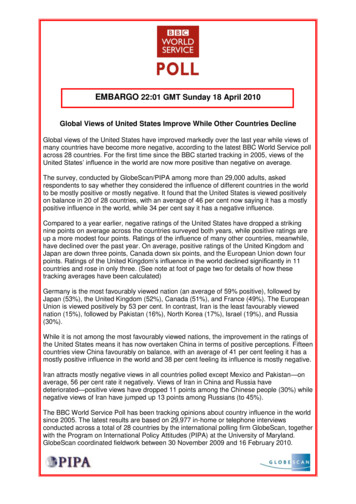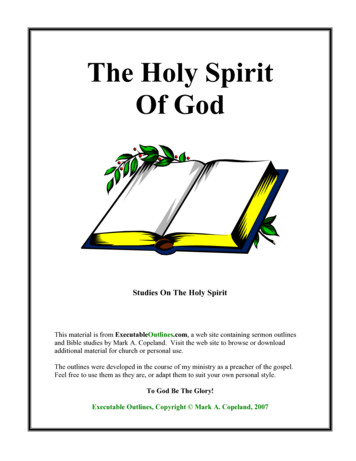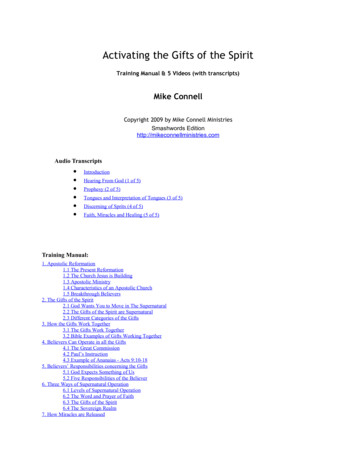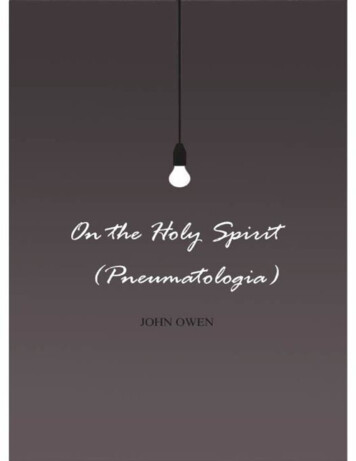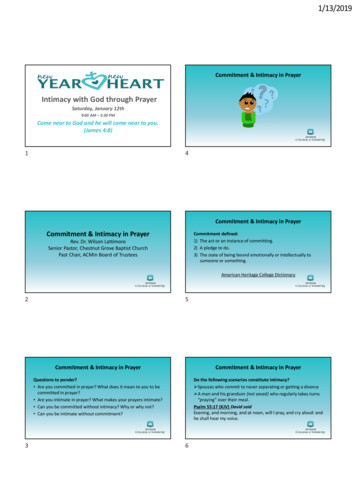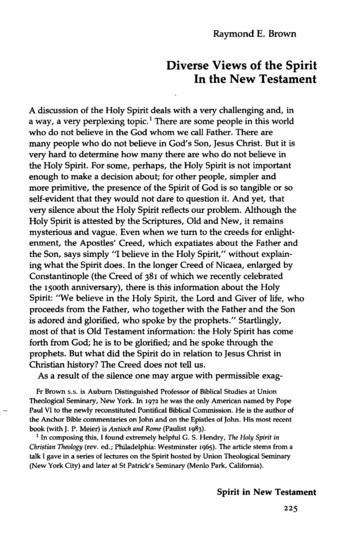
Transcription
Raymond E. BrownDiverse Views of the SpiritIn the New TestamentA discussion of the Holy Spirit deals with a very challenging and, ina way, a very perplexing topic.1 There are some people in this worldwho do not believe in the God whom we call Father. There aremany people who do not believe in God's Son, Jesus Christ. But it isvery hard to determine how many there are who do not believe inthe Holy Spirit. For some, perhaps, the Holy Spirit is not importantenough to make a decision about; for other people, simpler andmore primitive, the presence of the Spirit of God is so tangible or soself-evident that they would not dare to question it. And yet, thatvery silence about the Holy Spirit reflects our problem. Although theHoly Spirit is attested by the Scriptures, Old and New, it remainsmysterious and vague. Even when we turn to the creeds for enlightenment, the Apostles' Creed, which expatiates about the Father andthe Son, says simply "I believe in the Holy Spirit," without explaining what the Spirit does. In the longer Creed of Nicaea, enlarged byConstantinople (the Creed of 381 of which we recently celebratedthe 1500th anniversary), there is this information about the HolySpirit: "We believe in the Holy Spirit, the Lord and Giver of life, whoproceeds from the Father, who together with the Father and the Sonis adored and glorified, who spoke by the prophets." Startlingly,most of that is Old Testament information: the Holy Spirit has comeforth from God; he is to be glorified; and he spoke through theprophets. But what did the Spirit do in relation to Jesus Christ inChristian history? The Creed does not tell us.As a result of the silence one may argue with permissible exagFr Brown s.S. is Auburn Distinguished Professor of Biblical Studies at UnionTheological Seminary, New York. In 1972 he was the only American named by PopePaul VI to the newly reconstituted Pontifical Biblical Commission. He is the author ofthe Anchor Bible commentaries on John and on the Epistles of John. His most recentbook (with J. P. Meier) is Antioch and Rome (Paulist 1983).1In composing this, I found extremely helpful G. S. Hendry, The Holy Spirit inChristian Theology (rev. ed.; Philadelphia: Westminster 1965). The article stems from atalk I gave in a series of lectures on the Spirit hosted by Union Theological Seminary(New York City) and later at St Patrick's Seminary (Menlo Park, California).Spirit in New Testament225
geration that this one Spirit whom we praise ("one Lord, one Spirit,one baptism") has been the most divisive feature in the history ofChristianity. In the first millennium of Christianity at the greatCouncils the churches could agree on God and, for the most part onJesus Christ; but East and West ultimately split apart over the Spirit.The West adhered to the notion that the Spirit comes forth from theSon (filioque) as well as from the Father, a view rejected by the Eastas an intrusion in the Christian creedal faith. For the East the Spiritproceeds from the Father alone.And if in the first millennium the relation of the Spirit to Christdivided Eastern Christianity from Western, in the mid-second millennium the relation of the Spirit to the church subdivided the West.The Reformation was a battle among Western Christians who wereunited in the belief that the Spirit had come forth from the Son (aswell as from the Father) but who were very divided over how theSpirit functioned in the church. Did he function in such a way thatthe official spokesmen of the church, the hierarchy or bishops, werethe interpreters of the Christian faith? Or could the Spirit speakthrough the Scriptures in such a way that readers of the Scripturecould challenge the teachings of the church hierarchy? If the answerto those questions divided Western Christianity into Protestant andRoman Catholic, Protestant Christianity can be said to have dividedfurther on whether that Spirit speaks through the Scriptures in thechurch (as both Calvin and Luther would insist) or so individually inthe heart of every Christian that the Bible read in a personal way,without church tradition or church setting, is an adequate guide.The latter principle produced the charismatics and enthusiasts of"the Left Wing" of the Reformation.Moving on from the mid-second millennium, one may say thatthe twentieth century is further divided on the problem of the Spiritof God and the human spirit. A real issue that faces Christianitytoday is whether we are thinking simply of a vitalization of a humanspirit that is already in every man and woman by the fact of existence on this earth, or we still believe in a Spirit given by God thatgoes beyond our own potentialities, the Spirit of a revealing andendowing God.For this discussion I cannot offer a good bibliography, because,frankly, I do not think there is an adequate book on the Spirit in theNew Testament that explores the topic in a critical, modern sense.Raymond E. Brown226
There is a new book on Christ in the New Testament almost everyyear, but there is an almost total absence of comprehensive books onthe Spirit in the New Testament.In part, the absence of adequate bibliography may reflect the difficulty of the discussion. Even the term "spirit" is ambiguous. TheGreek word pneuma occurs about 380 times in the New Testament.Many times it refers to evil spirits, angelic spirits, or simply andvaguely "spirits." Rather seldom does pneuma clearly refer to whatwe know as the Holy Spirit. When one presses back to the Master,the term "Holy Spirit" or "the Spirit" in this proper sense occursrelatively seldom on Jesus' lips. (Yet for him the Spirit is not insignificant: blasphemy against the Son of Man can be forgiven, but notblasphemy against the Holy Spirit — a harsh warning.) Pneumaoccurs some seventy times in the Book of Acts, almost one-fifth ofthe New Testament instances. The Book of Acts is the story of thechurch, and so we may deduce that, drawing from the relatively fewinstances in Jesus' own discourse, the church gave pneuma a majorrole. Also in the Pauline Letters, the elevation of the Spirit is startling. Already in the opening five verses of 1 Thessalonians, the firstextant Christian writing composed about A.D. 50 when Christianitywas not twenty years old, we hear of God the Father, the Lord JesusChrist, and the Spirit. The famous blessing at the end of2 Corinthians (13:13) involves the grace of the Lord Jesus Christ,and the love of God, and the fellowship of the Holy Spirit. In thedivided Corinthian church there are varieties of gifts but the sameSpirit; varieties of service, but the same Lord; and varieties ofworkings but the same God (1 Cor 12:4-6). It is very clear that Godthe Father, the Lord Jesus Christ, and the Spirit are already on alevel within the first twenty years of the Christian message. But onthat level, how do they function?The Father, God, is Kyrios, "Lord," a name used in Greek to render the YAHWEH of the Israelite Scriptures. Jesus also is Kyrios,"Lord," for he is given the name that is above every other name(Phil 2:9). Finally there is that solemn statement in 2 Corinthians3:17, "The Lord is the Spirit; where the Spirit of the Lord is, there isfreedom." Thus the same divine name is used of all three; yet thesame things are not affirmed of all three. Jesus says "The Father isgreater than I," and the Spirit is the Spirit of Jesus Christ.Granted this unity and disunity, let me now try to organize theNew Testament material under the three divisions I discussed in mySpirit in New Testament227
opening remarks: the Spirit and Christ; the Spirit and the church;and the Spirit and humanity.THE SPIRIT A N D CHRISTThe New Testament reflection on the Spirit was part of the Christianattempt to understand Jesus. Despite the crucifixion, belief gainedthrough an encounter with the risen Jesus forced Christians to saythat he was the fulfillment of the Old Testament promises, eventhough many of those promises had not been visibly fulfilled.Christians-sought to detect such fulfillment in the various momentsof Jesus' life. Very clearly the resurrection early served this purpose:Jesus had been among them as a servant, but then God had elevated him and exalted him through the resurrection. Connectedwith that was the gift of the Spirit.In part, this connection may have been made because "spirit" wasthe life-giving power. In early Hebrew understanding, "spirit" and"breath" are one word, so that God gave to human beings the spiritof life. In Genesis 7:21-22 all flesh consists of "all in whose nostrilsis the spirit of life." "The Lord stretches out the heavens," saysZechariah, "and forms the spirit of a human being within him"(12:1). When one is alive, then, one has the spirit. When one dies,one gives up the spirit, as Jesus did on the cross when he breathedout his Spirit. And what God did in the resurrection was to returnthe Spirit to Jesus; and in this returning of the Holy Spirit, Jesus isglorified. We hear of this glorification in old creedal formulas in theNew Testament, some of them in the Pauline writings but antedating Paul, for example, "Jesus was vindicated in the Spirit"(1 Tim 3:16). Famous is the passage in Romans 1:3-4 about Jesus,God's Son, who was descended from David according to the flesh,but constituted Son of God in power through the Holy Spirit (literally,Spirit of Holiness) by resurrection from the dead. What an awesomeconglomeration of ideas: God constituted Jesus as his Son throughthe Holy Spirit in power by resurrection. This connection of theSpirit with resurrection was so vivid in Christian minds becausetheir encounter with the risen Jesus brought them the same kind ofpower that marked Jesus' ministry, as we shall see when we turn tothe theme of Spirit and the church.Still, the resurrection context is not adequate to understand therole of the Spirit. If one associates the Spirit with the resurrection,how was the Spirit in Jesus during his life and his ministry? There isRaymond E. Brown228
a very strange statement in the Fourth Gospel that may catch thebeginning of Christian reflection on this problem. In John 7:39 Jesusspeaks by way of promise: from within him (presumably from himself) there shall flow rivers of living water. The evangelist attemptsto enlighten us: by the "living water" Jesus was referring to theSpirit which those who came to believe in him were to receive, "Foras yet there was no Spirit." Usually this peculiar statement is translated, "For as yet the Spirit had not been given"; but that is notwhat the author writes. He writes, "As yet there was no Spirit,"almost as if the Spirit as a reality for Christians would not come intoeffect until after the ministry of Jesus. Yet other New Testamentpassages insist very strongly that the Spirit was present in theministry of Jesus, whether it could be recognized by his followersor not. In the Lucan reference (11:20) to the healings and, especially,to the driving out of demons, Jesus says "If it is by the finger of Godthat I cast out demons, then the kingdom of God has come uponyou." But Matthew (12:28) writes, "If it is by the Holy Spirit that I castout demons then the kingdom of God has come upon you." Thischanged wording means that as Christians reflected on Jesus' language during his ministry when he characterized divine assistanceas the finger of God, they saw that assistance embodied in the HolySpirit. All the gospels, at the very beginning of Jesus' public ministry, connect what he was with the Holy Spirit coming down uponhim at his baptism. In the Pauline formulas we heard that Jesus wasconstituted Son of God through the Holy Spirit by resurrection fromthe dead. But in the gospels, as declared by God himself, Jesus isGod's Son through the Holy Spirit by baptism. And Luke 4:14 says,"He returned to Galilee in the power of the Spirit," still using language similar to Romans. In the Spirit the power of God came uponhim; and, indeed, in Luke 4:16-18, when Jesus opens the Scripturesin his first sermon, he begins: "The Spirit of the Lord is upon me."Yet the Christian understanding of Jesus as possessing the HolySpirit is not satisfied by resorting to the beginning of the ministry. Itis not sufficient to say that through the resurrection Jesus is Son ofGod through the Holy Spirit; it is not sufficient to say that throughthe baptism Jesus is Son of God through the Holy Spirit. Reachingback earlier, Matthew and Luke start their gospels with the conception of Jesus through the Holy Spirit. Indeed, the angel Gabriel inLuke 1:35 virtually recites for Mary what Paul recites as a Christiancreed. If Paul writes "constituted Son of God in power through theSpirit in New Testament229
Holy Spirit by resurrection," Gabriel changes resurrection to conception and says to Mary, "The Holy Spirit will come upon you; thepower of the Most High will overshadow you; therefore the child willbe called holy, the Son of God." The sense that the Holy Spirit wasan integral part of Jesus' identity has been moved back to his conception. But even this answer is not adequate in the Christian struggle to understand Christ and the Spirit, for others will implicitlyidentify the Spirit that comes on Jesus Christ with the Spirit of Godthat moved across the waters at the creative moment (Gen 1:2). Thecreator Spirit is seen to be part of the mystery of Christ. And so Johndoes not begin his story of Jesus Christ with either the baptism orthe conception of Jesus. He moves the Jesus story back to the creation: "In the beginning was the Word, and the Word was with God.The Word was God and through Him all things were created" (John1:1-2). John echoes the beginning of Genesis when the Spirit movedover the waters while God spoke the creative word. One psalm(104:30) says "You send forth your Spirit and they are created";another psalm (148:5) says God "commanded and they were created."The Word of God and his Spirit were both involved in the creation,and they were together from the beginning.THE SPIRIT A N D THE CHURCHIn all these stages (creation, conception, baptism, resurrection) theSpirit plays a role in what God has done in Jesus Christ, so intimatea role that one cannot separate the two. Jesus acts by the Spirit: ifthe Spirit creates, the Word creates; if the Spirit sanctifies, Jesussanctifies. That same understanding is carried over as the churchreflects on itself, but now the Spirit succeeds to Jesus. He is the lastactor in the divine plan that began with creation and has continuedwith the cross and resurrection. In various works of the New Testament, however, there are different views of how the Spirit works inthe Christian community, in the church.In the 50S at Corinth, Paul sees many roles and activities in thechurch: there are apostles and prophets and teachers and healers —such a variety of gifts, but the same Spirit. Or even, there are Spirits, for Paul uses the plural: "Being zealous for the Spirits, seek forthe edification of the Church" (1 Cor 14:12). The Spirit is a manysplendored thing, so that it breaks up into manifestations. A specialgift of the Spirit is required in order to discern the Spirits. This viewwould have the Spirit endow Christians with abilities. Yet there areRaymond E. Brown230
ambiguities in this concept. Clearly, Paul would say that he was notan apostle because of any ability of his own: his apostleship was agift directly from God. One might speak similarly of the prophetand the healer. But would Paul say the same for the teacher andadministrator? Do those functions involve the gift of the Holy Spiritworking with the human spirit? To what extent is such a gift or such aspirit both from above and below at the same time? We never getinformation on that. The very fact that people want a specific gift ofthe Spirit not already possessed means that in some way the Spiritcorresponds to the human personality. Paul's description of the giftsof the spirits or charisms at Corinth is a favorable description and,indeed, he himself has the gift of apostleship, speaks in tongues,and can prophesy. Yet he is also aware of the divisive nature of suchgifts or spirits in the Christian community. Paul insists that it is justas foolish for someone who has one gift to want another as for thehand to want to be a foot. His whole imagery of the one body ofChrist is sketched because the gifts of the Spirit are also a dividingfactor.We see in the later derivatives of Pauline theology how that factorultimately became too divisive, so that another understanding of theSpirit developed. In the Letters to Timothy and Titus, the PastoralLetters, where Paul is disappearing from the scene, the questionarises: How is the church of the future to be provided for whenthere are no more apostles? The answer is to choose the presbyter/bishops (and deacons), that is, church administrators, and get themin place in every church. They can preserve the tradition; churchoffice will hold the church together. And it is understood that whena church officer is selected, the Holy Spirit is involved in empowering that office. (This correlation of office and Spirit becomes evenmore rigid in subsequent church writings.) Instead of the Spiritspontaneously endowing various members within the community,the Spirit is seen to function much more in the organized church,particularly in the ability of the presbyter/bishops to teach. In thelanguage of sociology, there is a routinization of the Spirit. Such aSpirit-endowed structure has a great advantage: it will continue.Charismatic groups are always imperiled if the charism does notreappear in the second generation. The great charismatic leaders ofIsrael, the Judges, were finally left by the wayside because in moments of real need there might be no one who had a charism. Themonarchy was established with the claim that the Spirit of wisdomSpirit in New Testament231
and understanding came on the king at the moment of his coronation, and so the Spirit was tied to the royal institution in the guidance of God's people. The same thing happened in the Christiancommunity. In place of many diverse charisms, the Spirit functionedmore surely through the office.But such routinization is not a total picture. The Book of Acts,which is related to the Pauline tradition in some way, emphasizesanother understanding of the Spirit. Acts thinks of the Spirit cominglike a mighty wind at Pentecost when the disciples do not knowwhat to do, even though they have seen the risen Lord. It is theSpirit that drives them to preach, indicating that their task is to proclaim Jesus Christ. Later on, the apostles stay on in Jerusalem and arenot pictured as quickly moving out, but the Spirit drives otherChristian missionaries from Jerusalem to approach outsiders —Samaritans and eventually even Gentiles. Peter, the leader of thetwelve apostles, is totally astounded; but if the Spirit wills to bepoured forth on even the Gentiles, why should Peter resist(Acts 10:46)? When the ultimate decision destined to shape thewhole nature of Christianity comes up in the so-called Council ofJerusalem, namely, the question whether the church is to be openfreely and totally to the Gentiles, it is settled thus: "It has seemedgood to the Holy Spirit and to us" (Acts 15:28). In other words, Actsdoes not emphasize a Spirit attached to office, but a Spirit that comessweeping in at decisive moments to tell the apostolic figures whatto do. If one may use stage language in a way that is not pejorative,we have a Deus ex machina, with the Spirit of God coming in to solvethe issue.Such a Spirit has remained a very strong anticipation in Christianthought. In great moments the Spirit acts in the church in someundefinable way and moves the church towards what it should do.At the opening of the Second Vatican Council there was a solemnprayer to the Spirit because this was looked on as a moment whenthe church uniquely needed guidance. As a matter of fact, at theCouncil the Spirit led the church in a different way from what manychurch officials wanted and expected, even though in Catholictheology those officers received the same Spirit when they receivedtheir office. In other words we had a modern example of the Spiritendowed office of the Pastoral Epistles being corrected by the occasionally onrushing Spirit of the Book of Acts. Another problem isthat Acts, with its thesis of the Spirit arriving at chosen moments,Raymond E. Brown232
tends to give a blank check on the Spirit. We Christians can alwaysclaim that we have done what we have done because the Spirit ledus. But it is not so easy to prove the Spirit's influence. There is astory told of an elderly Roman Catholic woman who was quite resistant to all the changes of Vatican II. She fought her pastor all thetime. Finally he lost his patience with her and he said: "Can't yousee that the Holy Spirit is leading the church to make all thesechanges?" And she answered him, "Well, that's funny; the HolySpirit is leading us to make changes that the Holy Ghost never usedto approve of!" In other words, when the church depends on theoverall guidance of the Holy Spirit and then makes radical changes,do such changes imply that the Spirit was not with the church'spractice previously?There is still another powerful understanding of the relation between the Spirit and the church that is not covered by charisms(i Corinthians), by Spirit-endowed office (Pastorals), or by the greatmoving Spirit (Acts). It is found in the Gospel of John. That Gospeldeveloped another term for the Spirit, not the neuter term pneumabut paraklëtos, a personal term. "Paraclete" defies definition: it is alegal term, "advocate," and certainly the Johannine Spirit has legalfunctions in defending Jesus Christ and proclaiming the worldwrong. The ultimate proof that Jesus was victorious over death isthat a personal Spirit who represents him testifies. In the Old Testament, Job ultimately realized he could not prove himself right in thetrial before God; but he prayed that his vindicating angel wouldstand upon his grave and prove to the world that he was right (Job19:25). Similarly, the Paraclete, the Spirit of Truth, is the defendingangel of Christ. He is also the teacher of the individual Christian: "Ifyou love me and keep my commandments, then at my request theFather will give you another Paraclete to be with you forever"(14:15). "The Paraclete, the Holy Spirit. . . will teach you everything" (14:26). Thus the Spirit is not confined to charismaticswhether they be apostles or prophets or teachers or administratorsbut is the possession of every believing Christian. The ultimateteacher of the church is not the property of any office. The churchwas not crippled when the apostles died; for, indeed, it was theParaclete/Spirit that enabled the first generation to bear witness.This same Paraclete/Spirit enables the ordinary believer to bear witness just as effectively as the first generation bore witness. This isnot the sweeping Spirit ofy Acts, coming at an awesome moment;Spirit in New Testament233
rather the Paraclete is always there. Ultimately such an understanding of the Spirit means that there is no such thing as a second-classChristian either in position or in time because every Christian hasthe Spirit of God in his or her heart. And yet, this understandingtoo has its difficulties. If the Spirit is in the heart of every Christian,what happens when two Christians disagree? How does one knowwhich is the voice of the Spirit? Later on in this same Johanninetradition that gave us the Paraclete, another writer has to warn complainingly, "Do not believe every Spirit; rather put these Spirits tothe test. . . so we can know the Spirit of Truth from the Spirit ofDeceit" (i John 4:1,6).THE SPIRIT A N D THE H U M A N SPIRITWe turn to the final question, after our discussions of the Spirit andChrist and of the Spirit and the church. What about the Spirit andthe human spirit? If there is the Spirit of Truth that comes fromGod, and if according to the New Testament there is a Spirit of Deceit that comes from the devil, we can say further that there is thehuman spirit. It is neither precisely of God nor of the devil; butunfortunately it is capable of working not only with God but alsowith evil. There the Scriptures show ambiguity. God created us bybreathing into us a living spirit, and so every living human beinghas the spirit. When God gives us life, he answers the prayer,"Send forth your spirit." Job (34:14-15) cries out, "When God takesback his spirit. . . human beings descend into the dust." Still theOld Testament insists that there is a special spirit. Every humanbeing may have the life-giving spirit; but when the spirit comes onElijah, he can act as a prophet. He passes on a twofold spirit toElisha, and that person becomes different: a prophet more mighty indeeds than his master. Every human being may have the spirit, butthe king at his coronation gets the spirit of wisdom and understanding and counsel and fortitude and knowledge and piety or fear ofthe Lord (Is 11:2). Every human being may have the life-giving spirit, but when Saul in an unforgettable moment is seized by the Spiritof God, that king of Israel rolls about naked in the dust and everyone says: "Is Saul also among the prophets?" (1 Sam 19:23-24).Evidently biblical writers could distinguish between the human spirit that comes from God and a special Spirit that comes from God.The same distinction is true in the New Testament. All humanbeings are created in God's image and likeness, and all have hisRaymond E. Brown234
spirit. Yet, according to Paul and to John, those who believe in JesusChrist receive God's Holy Spirit. They are the children of God! Asuncomfortable and exclusive as it may seem, one would be hardpressed to find either John or Paul saying that every human being isa child of God. Childhood or sonship is the particular privilege ofthose who are given the Spirit of Jesus Christ.What difference does Jesus Christ make in the special Spirit givenin his name? Eastern and Western Christianity are divided over thatpoint. If we identify the Redeemer's Spirit with the creator Spirit,that creator Spirit proceeds from the Father. Yet does not JesusChrist, the Redeemer, make a difference? God never changes, but intrinitarian life God the Son becomes human, and he was not humanbefore. Classical theologians cannot admit change, and so they positonly a new relationship in God. Yet because the Son of God lived aswe live, and died even more horribly than most of us die, is notGod's experience different? Therefore, when the Spirit is given byJesus Christ, is not that Spirit marked by the Son as well as by theFather? The Spirit that lives in the heart of those who are God'schildren, conformed to the image of Jesus Christ — is it not differentin some way from the spirit that conforms all human beings to thecreator God? In another way of asking the question, can we be satisfied with saying that all that is noble comes forth from the humanspirit that exists within us? Ultimately, must we not turn to God'sSpirit who comes into us and not simply out of us?I have said that in the Bible "spirit" has many meanings; oftendiverse meanings receive the same treatment in modern thought. Aspart of demythologization, the devil as the evil spirit is lost to manyChristians. Inevitably, then, the spirit as the Holy Spirit of God isgoing to be lost. The same mentality that claims that in the worldcan be no evil which is not of our creation will ultimately say that inthe world there can be no good which is not of our creation. Themystery of evil, however we express it, is closely tied to the mysteryof good. It is interesting to reflect on hell as an embodiment of themystery of evil. Among some strands of modern thought one mayfind parallels to ideas expressed in such diverse writers as JohnMilton and Jean Paul Sartre. According to Milton's Satan, "Hell is myself"; and indeed many could say, "I myself constitute my own hell."According to one of Sartre's characters, "Hell is other people"; and,alas, in the complex issues of life, including those of the family, ourSpirit in New Testament235
hell often is other people. But the classical definition of hell is theabsence of God; and experiencing the absence of God may still bethe most profound understanding of what it is for a human being togo through hell. The Holy Spirit is the refutation of that hell.God was diffusive of his being in creating a good world that mirrored him, and especially in creating intelligent human beings thatmirrored his intelligence. But God could not be satisfied until hebecame embroiled in human history with all its successes and failures by identifying himself with one people. (Israel as the specialpeople of God is a concept with the faults of particularism, but wecan never live by abstractions.) Still God was not satisfied, and so hefurther embroiled himself in one human life, that of Jesus Christ.But God's ultimate act of presence to the world that he created andredeemed involves his entrance into individual lives as the HolySpirit. The Holy Spirit is the ultimate revelation of God. If hell is thefinal absence of God, the Spirit is the supreme presence of God, apresence that the Book of Acts describes as a mighty wind andtongues of fire, a presence that the Christian hymns describe as asweet cooling (dulce refrigerium). The Spirit brings burning power andcooling consolation and whatever gift is needed to assure us of thetruth of the promise of the Johannine Jesus: "If you love me andkeep my commandments the Father will give you another Paraclete,the Spirit of Truth, to be with you forever. . . . He remains withyou and is within you" (John 14:15-17).Raymond E. Brown236
sCopyright and Use:As an ATLAS user, you may print, download, or send articles for individual useaccording to fair use as defined by U.S. and international copyright law and asotherwise authorized under your respective ATLAS subscriber agre
the Spirit in the New Testament. In part, the absence of adequate bibliography may reflec dift th e ficulty of the discussion. Even the term "spirit" is ambiguous. The Greek word pneuma occurs about 380 times in the New Testament. Many times it refers to evil spirits, angelic spirits, or simply and vaguely "spirits."



